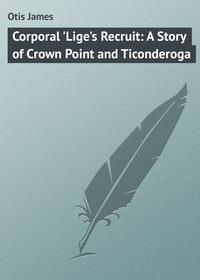
Commodore Barney's Young Spies
The old man looked inquiringly at Jerry, and my partner said slowly much as if not being exactly certain what he thought of the scheme:
"I'm willin' to go if it so be you want to keep the pungy here; but 'cordin' to my way of thinkin' the chances are against our gettin' there in the canoe."
"You can do it if the wind don't breeze up, an' it ain't likely to at this time of the year." Then, as if considering the question settled absolutely, Darius cried out to Jim, "Have you stowed everythin' in the canoe?"
"Ay, sir, an' I've taken all the provisions for them, so we'll be left to suck our thumbs when we get right hungry."
Darius not only planned the journey while we were absent; but had gone ahead with the preparations as if advised in advance that we would agree to it.
"Well, there was no use in hanging back, since the thing must be done, and I had sense enough to know that if we were going to make the venture the sooner it was begun the better chance we had for succeeding, therefore I went over the rail into the canoe, where I found a small sprit-sail, a package of food, and one musket with powder and balls sufficient for two or three charges.
"We've done the best we could by you, lad," Darius called out as he saw me examining the cargo. "You'll soon be where you can lay in a good supply."
"Yes, if we don't go to the bottom first," I replied just a trifle sharply, whereat Darius replied with a laugh:
"I'll trust you for that part of the business. Bill Jepson should be a master hand with a paddle, an' take it all in all, you're bound to push ahead right fast."
"How are we to find you again?" Jerry asked.
"The commodore will attend to that part of it. We'll stay here foolin' around as agreed upon, for a week – unless we get important news before then – , an' if you haven't shown up I'll allow that Joshua Barney set you about other business."
Jerry and Bill Jepson took their places in the canoe, the latter stepping the small spar to which the bit of canvas was rigged, and as I ran a paddle out over the stern to take the place of a rudder, I was astonished at feeling that the little craft was making remarkably good headway.
Almost at the same moment we started, the pungy was hauled around for the Delaware shore, and in less than five minutes she was lost to view in the darkness.
"How is she doin'?" the old sailor asked as he leaned over to watch the rush of water along the side.
"Better than we could shove her with the paddles," I replied, not feeling overly inclined to talk very much.
"Then I can't see but that everything is as smooth as grease, an' what's better'n all else, we're leavin' the bloomin' Britishers astern in a way to make my heart glad. The wind is likely to increase before it lessens, so we'll be a good bit on our way by sunrise."
"Ay," Jerry said grimly; "but if you've lived in Baltimore you know what the mouth of the Potomac is when the breeze comes strong, an' I don't allow that this canoe would make any too good weather of it in a heavy sea."
"She should be able to do it all right," Jepson said carelessly, and then he set about filling a pipe he had borrowed from Darius, as if there was nothing in the world to cause him trouble.
After he had lighted the tobacco he must needs ply us with questions regarding Joshua Barney, to which we could make no very satisfactory replies because of our ignorance; but he seemed to think it his duty to keep a conversation going, regardless of the fact that both Jerry and I showed plainly our disinclination to do very much tongue-wagging.
When an hour had passed, and the canoe was walking along in right smart style, surprising me by her performance under sail, for I had never supposed she could be used in such fashion, Bill Jepson said suddenly:
"Look here, what's the use of all hands standin' watch? Give me the paddle, an' I'll steer while you lads get a bit of sleep. I'll call you when its time to take your trick at the helm."
At first I was inclined to hold my place; but thought differently when I saw Jerry curling himself up in the bow for a nap, and gave the paddle to the sailor, saying as I did so:
"I don't count on sleeping very long; but if you should come up to the Potomac before I turn out, it would be a good idea to call me."
"I reckon you think that because I'm a deep-water sailor I ain't fit to be trusted with one of these Chesapeake cockle shells; but bless your heart, lad, I've always knocked about in 'em, an' you shall see that I'll handle you tenderly enough."
I laid down in the bottom of the boat, under the thwarts, and contrived to make myself so comfortable that in less than five minutes I was sleeping soundly.
When next I became conscious of anything there was at least two inches of water under my back, and the spray was coming over the starboard side at a rate that threatened speedily to founder the little craft.
Jerry, being in the bow which stood higher out of the water, had not been disturbed.
"What's the matter?" I asked in alarm, crawling out from under the thwarts with no little difficulty.
"Matter? Nothin' as I knows of," Bill Jepson said as if surprised that I should have asked such a question. "What made you think anything was wrong?"
"Why we're half full of water, man, and if it keeps coming in at this rate it'll soon be a case of swimming!"
"It's a bit dusty, that's all; but the canoe is doin' her work like a lady. We're well nigh across the Potomac, an' just a hummin'."
The day was breaking, and in the gray light of early dawn I could see the little craft laboring under her rag of a sail in a manner that sent my heart into my mouth, although I'm not given to being timorous on the water.
"We must get in some of that sail," I cried, forced to yell at the full strength of my lungs in order to be heard above the rollicking sea song in which Bill Jepson was pouring forth his musical soul.
"Let her go as she is; I'll answer for it that no harm will be done." Bill said with a laugh as he cut short his song. "We wouldn't be in as good shape with the paddles, an' that's a fact."
By this time Jerry had awakened, and he, like me, had the idea that we were storming through it at a hotter pace than the canoe could safely stand; but the sailor insisted that nothing was wrong, although he did suggest it might be a good idea if we baled the craft a bit, and we were forced to act upon his advice in order to save ourselves from being swamped.
The canoe rode more easily when the liquid load had been taken from her, and I came to the conclusion that perhaps it might be as well to let Bill Jepson have his way since we were cutting down the miles in great shape, and speed was the one thing necessary for us just at that time.
We were forced to use the baling dishes about every ten minutes before crossing the mouth of the river, and then the little craft made better weather of it, to the great relief of both us lads.
No one would ever have suspected that Bill Jepson was a deserter who would surely be hanged if the Britishers caught him. He sang, told stories of a wild and terrible kind, mimicked the officers of the Narcissus, and explained what the Americans would do when the enemy came up the bay, going into the details of the naval maneuvers as if perfectly familiar with all the defenses, instead of being wholly ignorant of everything connected with the war save from an English standpoint.
It was not a very appetizing breakfast which we had that morning, for the food, stowed in the stern of the boat, was soaked with water; but to lads who had never been accustomed to luxuries a little thing like fasting did not seem to be of much importance.
The breeze, which had been freshening all night, increased with the rising of the sun, and Jerry and I, unwilling to suggest that the sail be reefed, saw the little craft humming along under the guidance of Bill Jepson, when, had we dared assert our authority, she would be creeping with no other motive power than the paddles in the hands of two tired boys.
At noon we landed on the southerly side of Hog Point, where I knew a fisherman lived, and went toward the house hoping we might be able to get something in the way of provisions, for I had in my pocket the money which had been paid by the officers of the Narcissus.
Bill Jepson remained in the canoe, to "keep ship" as he said, and Jerry and I walked through the small growth of timber nearly encircling the building, with never a thought of keeping ourselves concealed from view; but yet remaining silent for the very good reason that we had nothing of interest to say to each other.
Thus it was by mere chance that our approach was almost noiseless, and when we were come within view of the dwelling, from whence we could hear the hum of voices, none of the inmates were aware of our presence.
This man – Jenkins was his name – had a wife and one child, as I well knew, therefore hearing the sound as of several voices, I naturally looked out from the underbrush before showing myself, for there was in my mind the thought that he might have a party of Britishers as visitors.
One man, and he the owner of the dwelling, was lying on the grass just outside the window, talking with another who was seated within the building, whose head and shoulders only could be seen; but one glance at the face was sufficient to cause me to draw suddenly back as I motioned to Jerry to advance where he could have a view of Jenkins' visitor.
It was Elias Macomber who sat at the window, talking with his host on the outside, and we could readily overhear the conversation.
Under ordinary circumstances I hold that an eavesdropper is the meanest kind of a person; but considering all the facts of the case, it seemed just then that it was our duty to learn all we might.
As we came up Jenkins was evidently opposing something which the traitor had said, for when we were in position to listen, Macomber cried sharply:
"I shall watch out for the British fleet, an' board the first vessel that heaves in sight. I reckon I can tell the admiral somethin' which he'll like to hear."
"But, Elias," Jenkins remonstrated, "even though you don't believe in the war, surely you wouldn't do that which might work harm to your neighbors?"
"I'm an Englishman!"
"By comin' here an' settlin' down, you turned into an American, or should have done so. I claim that a man has no right to hold himself an Englishman when he moves into another country to live, never expectin' to go back to the old home. All your interests are here, an' by holdin' true to the United States you are benefitin' yourself."
"That's all rot. I work for what I get here, an' have no man to thank for it."
"But the laws of the country protect you; all the advantages to be had from the town where you live are yours, the same as others, an' when you take them you have no right to do harm to the land which feeds you."
"It's no use tryin' to argue me out of it, Jenkins, for you don't know how I've been treated in Benedict. I'll give the British commander all the information in my possession, an' it's enough to be of importance."
Just then a woman's voice from the inside of the house summoned Mr. Jenkins to some household duty, and I drew back among the foliage yet further, dragging Jerry with me.
"We'll stay right here till we get our hands on that cur!" my partner exclaimed when we were so far from the house that there was no danger the words would be overheard, "an' if Commodore Barney's men can't keep him a prisoner, we'll turn to an' see what kind of a fist we make of the job!"
I was of Jerry's mind; but there was nothing that could be safely done in broad day, and we went softly back to the shore that we might hold counsel with Bill Jepson.
We found the sailor sleeping peacefully on the warm sand; but had no compunctions about disturbing his slumbers, and after he was fully awake it became necessary to tell him the story of what we had done in the Patuxent, that he might the better understand the situation.
"So the spy is here, an' counts on stayin' till the Britishers come up the bay, eh?" the old sailor said half to himself. "What have you lads got in your heads?"
"We're goin' to get our hands on him once more, an' then take precious good care he don't have a chance to tell the Britishers what he knows concerning the commodore's fleet," Jerry said hotly.
"An' you count on doin' that first of all, eh?"
"Sure; that cur shan't have a chance to give us the slip!"
"But he said he'd stay till the fleet came up."
"Well?"
"That won't happen for three or four days yet, if all I've heard be true."
"It makes no difference to us when the vessels come. What we want is Elias Macomber!"
"What would you do with him, supposin' he was here this minute?"
"Carry him to Commodore Barney, of course."
"Can the four of us get along in the canoe?"
Jerry and I looked at each other in perplexity. It was a fact that the little craft would not carry four, particularly when one was a prisoner who might struggle against being taken up the river, and yet it seemed to me as if we were in duty bound to effect the capture.
"Now this is the way it looks to me," Bill Jepson said slowly, as if talking with himself, "though, of course, I ain't countin' on interferin' with you lads in any way: What I've got to tell the commodore is of more importance than the yarn Macomber can spin for the admiral, an' Darius Thorpe seemed to think I couldn't see the old man any too soon. Now if this 'ere sneak is goin' to wait where he is till the fleet comes, what's to prevent our keepin' on as we started, an' then comin' back to pull him in? This wind will set us up the river in great shape, an' within four an' twenty hours we should be at Nottingham, unless the town has been moved from where I saw it last."
I understood at once that the sailor's advice was good, and should be followed, yet it went sadly against the grain to go away from that place leaving the cur free to do us harm if the opportunity presented itself.
Jerry had much the same struggle in his mind as I, but, watching his face, I soon saw that he was ready to act upon Bill Jepson's suggestion, and without waiting for him to give his thoughts words, I said:
"Very well, if we're to go up the river first, there is no time to be lost. We must paddle the canoe close inshore until we get around the point, so that we may not be seen from Jenkins' house, and then we'll push her for all she's worth."
We no longer remembered that we were hungry; but jumped to the task as if every moment was precious, as indeed was the case if we would make Elias Macomber a prisoner for the second time.
As I had said in regard to paddling around the point, so we did, but once the canoe was so far beyond that she could not be seen from the dwelling, we hoisted the sail, and I dare venture to say that Bill Jepson might have run her rail under without hearing any word of protest from Jerry or me, so eager were we to be on the return voyage.
CHAPTER IX.
AN UNEXPECTED MEETING
It was as if the elements favored us in the race to Nottingham and indeed I counted it a race in which were pitted against us the British fleet and Elias Macomber.
The wind held strong, the day was cloudless, and the canoe, clumsy craft as I had always looked upon her, sailed like a bird. Bill Jepson insisted on holding the steering paddle, and we were well content to have him at the helm, for he held her so nearly to the course that our wake stretched out behind us straight as an arrow.
Under almost any other circumstances we would have made at least a short stop at Benedict; but now it was out of the question, and we sailed by at full speed, being hailed by several of our acquaintances who urged that we come to for a moment, but we resisted all such entreaties.
I knew that my mother, on being told we had refused even to so much as have speech with our friends as we passed, would understand we were on urgent business, and have no thought that I had slighted her.
When, in due course of time, we passed the mill from which had been taken the prisoners, it bore the appearance of being deserted, therefore we had good reason for believing that Macomber was the only one of our capturing who succeeded in making his escape.
It was late in the night before we came upon the fleet, and were brought to by a hail from the guard-boat.
The commodore was yet with the flotilla on board the Scorpion, so the sentinels told us; but they were minded to prevent our having speech with him at that unseemly hour.
Had Jerry and I been alone I believe of a verity we would have been forced to wait until morning before seeing Joshua Barney; but Bill Jepson could not be put aside as easily as two lads, and he roared out as if he had been an admiral of the blue at the very least:
"Tell him that Darius Thorpe has sent word from the lower bay, an' it must be delivered straight away."
In the darkness, when it was impossible to see him, no one could say that Bill was not a person of the greatest importance, and the sentinels, judging from his voice, must have concluded that he, or the man whose name he gave, was some one high in authority, therefore they not only allowed us to approach the schooner, but went before to announce our arrival.
The commodore was not the kind of an officer to keep any one in waiting simply that due respect might be shown to his station; but came on deck half-dressed, bidding one of the sailors to hold a lantern that he might see who we were.
"So you lads have come back in haste, eh?" he said, on recognizing Jerry and me. "Have you by chance lost the pungy?"
"No, sir; she is in the lower bay oysterin', with Darius in charge," I made haste to say.
"And who is this you have with you?"
"Bill Jepson, sir, who has served under you twice; but is now a deserter from his majesty's ship, Severn, having been pressed into the British service nigh to three years ago," the sailor replied, rising to his feet at imminent risk of overturning the canoe.
"I remember your face, my man. Come aboard at once, all hands of you."
We clamored over the rail, having made the canoe fast, and entered the commodore's cabin.
"When did you desert from the Severn?" Joshua Barney asked, showing more of excitement than I had ever seen him display.
"Last night, sir, an' it may be by so doin' I've upset some of your plans; but when I asked for help it never struck me that Darius might be there on special business."
"Tell me all the story," the commodore said, motioning toward me, and without delay I gave him a full account of what we had done, save that then I said nothing regarding Elias Macomber.
Then he questioned Bill Jepson regarding what he knew, and, if I am any judge of such matters, he got considerable valuable information.
The sailor was able to give him the names of nearly all the vessels in the two fleets, together with their probable weight of metal, and repeated the gossip which had leaked from the Severn's cabin through the marines on guard.
The commodore listened intently, making many notes as Bill spun his yarn, and when it was come to an end he said:
"You did well to steer for here at once; but I am inclined to believe that the enemy will move very soon. Is there anything else to be said?"
"I would like to speak about Elias Macomber, sir?" I made bold to say.
"That was the prisoner who escaped? One of them got away, and there is good reason to suspect that he received aid from some of our men. We have no time to look into the matter now; but it shall be thoroughly sifted later, and if there be a British sympathizer among us, it will go hard with him."
Then I gave him all the information we had concerning the traitor, and wound up by asking if there was any reason why we should not go back and re-take the cur.
"You may as well make the attempt, although I question if he can tell the enemy anything which is not already known. The utmost he could say would be that our force is small, and so much the British learned at St. Leonard's bay. However, I would like to have the fellow; but am not willing you should run into any danger for the purpose of effecting the capture."
"I believe that Jerry and I will be able to get hold of him, and we will go back at once, unless you have other work for us."
"There is nothing especial that you can do here. Warn Darius Thorpe to be ready for an immediate move on the part of the enemy, and tell him to make sail for the Patuxent at the first signs of activity. You lads had better get some sleep before setting off again. Go forward, and see that you have a hearty meal at once. Jepson, you will remain aboard the schooner."
Bill thanked the commodore, and the three of us went into a sort of forecastle which had been rigged up in the forward part of the vessel, where, after considerable arguing, we succeeded in getting so much food as satisfied our hunger, which was no small amount.
Then we turned in by lying down on deck, which was preferable to getting into a bunk on such a hot night.
As a matter of course we were aroused right early, even before any signs of a new day could be seen; but the three hours of sleep refreshed us wonderfully, and we were ready to set off down the river.
We managed, at the expense of considerable argument, to get a supply of provisions from the cook without awakening Commodore Barney, and, after a warm parting with Bill Jepson, cast off the canoe.
Because the wind was blowing straight up the river it was impossible to use a sail, save at the cost of considerable time, and we took to the paddles, which seemed like mighty hard work after our experience with the rag of a sail.
Don't let it be thought that we begrudged our labor; I would have paddled till the skin was worn from both hands for the sake of re-taking Elias Macomber, and looked pleasant all the while; but when a fellow has been flying over the water with no effort of his own save to keep the little craft on her course, he cannot but contrast that pleasure with the dreary work of shoving her ahead with an ashen blade.
Again we felt obliged to pass our homes without stopping. It would have taken a full hour, hurry as we might, to go ashore and speak ever so briefly with those who would greet us, and in that length of time Elias Macomber could, possibly, join his friends the Britishers.
"We'll keep well over on the eastern shore, where there is less chance of bein' seen, an' do our best at the paddles," Jerry said as we discussed the matter just before coming within sight of the village. "I'd give a good deal to see mother an' the children; but it seems as if we had no right to loiter."
I was of his mind, and we hugged the opposite bank of the river, keeping under the screen of foliage as much as possible, until there was no danger of being recognized.
During all that day and far into the night we paddled. Now and then one would stop to rest his arms; but the other continued the labor, therefore the canoe did not come to a stop from the time we left the fleet until we were arrived at Hog Point.
There we run her bow on the shore while we ate a hearty meal, and discussed the question as to whether it would be better to approach the house from the northerly or the southerly side.
I was in favor of going ashore where we then were; but Jerry won the day by suggesting that if we ran around on the other side, it would be possible to see if the British came up the bay, and this last was quite important to us in case we were forced to spend much time waiting for a fitting opportunity to catch our game.
After refreshing ourselves with food, we paddled around the point without danger of being seen, because it was so late in the night, and landed at the same place as before, knowing that from there we would have no difficulty in finding the dwelling.
After pulling the canoe up amid the bushes, and hiding her as well as was possible in the darkness, we laid down on the ground, falling asleep almost immediately we had stretched ourselves out at full length, and not until the first beams of the rising sun shone across our faces did we awaken.
It was but natural that we should look down the bay before doing anything else; but we saw nothing to disturb us. A small craft was coming slowly up, for the breeze was light; but to her we gave little or no heed.









